Drake London blacks out
He steals souls between the lines and he wants the rest of the Atlanta Falcons to join him in 2025. “Look at the Chiefs. Look at the Eagles. It only takes one year." Here's the making of the man.
FLOWERY BRANCH, Ga. — Conjuring the animal within is no easy task. Twenty-five minutes in, the wide receiver seated here speaks as if surprised anyone would fly south to interview him. Drake London calls himself “boring” and “simple,” the diametric opposite of every aesthetic we’ve come to expect at his flamboyant position. He admits he doesn’t even watch live sports much. London is easily distracted.
The Atlanta Falcons wide receiver never pines for targets. He sees no magic to his training regimen, calling himself nothing more than a “regular dude” who made it. He doesn’t waste his time buffing a social-media persona. No drama, no demons, no hardscrabble childhood. Mom and Dad are high school sweethearts who’ve attended nearly every game he’s ever played. This tender soul with the frizzy hair and billion-dollar smile is exactly who you’d love to date your daughter.
Off the field, his only kryptonite is performance cars. That’s as colorful as he gets.
London even points out that all 22 players on the field have mouths to feed, so he never wants to intentionally injure an opponent.
And with the blunt force of a crackback block, London issues a stern warning to any NFL cornerback listening: Do not test him. Do not disrespect him. Get personal after the whistle — say something that he deems has crossed the line? — and he will snap.
“That’s where I get a screw loose,” London says. “The soft, gentle… don’t take that for weakness.
“I’m still going to try to kill you.”
The sound of the 2025 NFL Season closing in might as well be the thunder of this player’s footsteps. Because right now? Drake London feels exceptionally disrespected. His name is never mentioned amongst the league’s elites. Not by grifters on daytime TV. Not by peers, who voted him the 97th best player in the sport. Not even by the execs, scouts and coaches in charge of all 32 teams. ESPN’s Jeremy Fowler polled ‘em all to rank their top wideouts. London, remarkably, was not one of the 26 receivers recognized. Those results weren’t yet public when Go Long hung out with London and it was as if the 6-foot-4, 215-pounder could feel their contempt.
When asked how he’s perceived outside of this building, all congeniality vanishes. “That’s a different topic,” says London, curtly.
Playing the underdog role is only fun to a point.
“It does motivate me a lot,” London says. “Do I want respect? Yes. I’m not in the media. I do my job more than a lot of these other cats do — willingly. I get the job done with what I’m asked and what I’m told. I don’t cause a big commotion about it. I’m not out here being a true diva.”
He’s got the numbers. His 1,271 yards on 100 catches ranked fourth in the NFL, and he scored nine touchdowns. He has also crushed DBs as a blocker to pop long runs and cleared out real estate for other receivers as a decoy, all while victimized by arguably the worst quarterback play in the NFL the last three seasons. London sees peers go berserk over much less turbulence, stays true to himself, and when his game goes grossly unappreciated? Now? He audibly laughs and says “thank you.”
Mainly because he knows what’s coming for this team.
In quarterback Michael Penix Jr., he sees himself.
“His face. His eyes,” London says. “You don’t see no panic or anything like that. And then? He’s a natural born killer with that football in his hand.”
And in this Falcons team, he sees a legitimate contender. London has visualized the parade through downtown Atlanta. The confidence isn’t manufactured propaganda. Players and coaches inside this building all genuinely feel the same way. Penix has declared that this offense should be the best in the NFL, adding “we should be unstoppable.” Look closely and you’ll see the original source of such optimism is London, the player that Terry Fontenot told us “literally blacks out” between the lines. The GM who selected London eighth overall in 2022 has looked into those cold eyes before kickoff. “Don’t talk to him,” Fontenot says, “because he’s angry. All he wants to do is beat the hell out of the other team.”
What does it look like when one of this sport’s hidden superstars blacks out?
Go Long plunged headfirst into the abyss to find out.
We are your home for longform journalism this 2025 NFL Season.
Thank you for joining our community.
Motivation is a fickle thing. At one end of the spectrum is the pro athlete who crosses their legs, closes their eyes and meditates positive outcomes in their mind. Rare is the athlete at the other end. Rare is the athlete who channels dark energy to dominate. That’s London. If his barbarism does catch on, title talk won’t sound so ludicrous.
Years before he was trying to dehumanize cornerbacks, London was a tyke playing flag football. Game time neared, and Dad approached him with troubling news. Dwan London informed his son that he was just in the restroom and overheard a bunch of kids on the other team say that No. 27 “doesn’t know how to play football.” Drake stared at Dad… aghast. When the Londons first bought their house — with no furniture in the living room — father and son conducted full-fledged football games. Each of their bedrooms served as “locker rooms.” They called plays, audibles, motions. Drake took his passion for the sport extremely serious.
This insult cut deep.
“Who?” son asked.
Dad pointed toward a cluster of kids in the distance and Drake fumed. A few minutes later, at the midfield coin toss, he mean-mugged the trash-talkers. “His face,” Dad recalls, “is just on fire.” The ball was kicked. Drake scored four touchdowns. Dad knew exactly what he was doing.
This entire story was made up. Fiction. Those kids hadn’t said a word about his boy.
That day, Dwan London realized he could tap into something special any day, any time.
Drake still remembers the icy sensation that ran through his veins.
“It put a fuel on my body — I don’t like disrespect,” he says. “That’s the secret sauce.”
His face is still very much on fire.
“Kill, Kill everything”
He doesn’t chase clout, but Drake London does promote the brands of others in the locker room. This day, the No. 1 wideout is wearing the paraphernalia of the team’s No. 2 wideout. “Mooney World,” his shirt reads. Fitting considering London takes such pride in distracting that deep safety away from Darnell Mooney.
If the Falcons win, he truly does not care if he caught two balls.
“And some people,” London says. “aren’t like that. Especially in my position.”
He can empathize with the temperamental wide receiver. This is a funky profession. Through endless wind sprints — on a good day — you’re presented with seven opportunities to do your job. No wonder so many devolve from irritated, to irate, to malignant and must be eradicated from the locker room. London has never viewed his position through such a lens because, to him, part of the job is creating opportunities for teammates. “Who am I to say ‘no,’ to a coach's ask to, ‘Hey block this dude so Bijan could go make his money?’” London says. “I’m going to go do that every single time.”
There’s no escaping the simple math. More targets directly equates to millions in your bank account. Point this out and — again — London insists he embraces all dirty work.
Yet, this is a fine line. Athletes who enter this dark dimension — who seek to humiliate the opposition — must inherently crave the ball. Two minutes left. Third down. Game on the line. When London’s eyes turn White Walker blue, of course he brings give-me-the-damn-ball energy to the party.
“Know for damn sure that if you want me to do that? I want to every play,” London says. “Don’t get it wrong. If the ball is thrown to me every play, I’m going to be just as happy as well. This is an alpha WR1 kill, kill everything. Because even if I’m blocking, even if I’m running a guy out, I’m still going to try to kill you regardless of what it is. What sets me apart from the rest is that in all three phases of the game, I’m going to try to kill you.”
So, that’s it.
Catching. Blocking. Clearing out. Face covered in eye black, all 70 of 70 plays in a game are executed with murderous intent.
After one catch vs. the Giants, he lowers a shoulder, blasts through safety Raheem Layne and immediately starts cursing. “Where you at!” he screams, seeking Layne out. “Yeah! Yeah! Yeah!” Against Carolina, in Week 18, he goes full Moss on corner Shemar Bartholomew for a 20-yard TD with three seconds left in the first half and proceeds to draw a taunting flag for staring down his victim for a full second. Hilariously, the No Fun League promoted the same play on its top 100 countdown, conveniently cutting the highlight before the laundry’s visible.
It’s the blocks he loves most, though. Since high school, London’s been teeing off on defensive ends, linebackers and defensive backs alike. At USC, receivers coach Keary Colbert flat-out told his guys they wouldn’t touch the field if they refused to block. London tried to emulate USC’s rabid upperclassmen, Amon-Ra St. Brown and Michael Pittman. Year 1 to 2 to 3, he gradually raised the temperature of practice himself. Fights broke out almost every day.
His primary foe back then was cornerback Chris Steele and the expletive-laced trash talk crossed all lines. By Saturday, the entire Trojans team was closer for it.
This summer, the Falcons are trying to create a similar world.
London treasures his duels with No. 1 corner AJ Terrell.
“That’s when it gets dangerous,” London says. “And I love that mentality about football. Because at practice? It’s ‘Alpha WR1. I’m going to kill you.’ AJ’s looking at me like, ‘I’m going to kill you.’ And then we get into it. But then when it’s game time, it's us versus them.”
As a pro, London is exceptionally “observant.” X’s and O’s are cut and dry. This was a kid back in third grade imitating Calvin Johnson’s intergalactic catches. “That’s what drew me to the game the most,” he says. “How far you could take it, the person you could become.” Today, London asks the Falcons film department for footage of past wide receivers all the time. He’ll study “Megatron,” Brandon Marshall, all bigger receivers who could run. And while he’s admittedly no “decepticon” transformer on the field, he is able to extract pieces from all greats — even the ones built completely different, like Miami’s Tyreek Hill.
The goal? Create something new. Establish his own flair. Take those USC practices. Yes, he closely observed the psychotic work ethic of St. Brown. “Thump! Thump! Thump!” London re-enacts St. Brown’s legendry JUGS machine — the future Lion would catch 200 balls a day from this contraption. Problem is, London hates the JUGS because it screws up his eyesight. He needs to see the flight path of the ball, from the QB’s hand to his own mitts. The only time he ever got into a funk catching the ball was when he started used the JUGS as a Falcons rookie. After going several weeks without dropping one ball, he missed three in one week.
London swore off the contraption and, knocking wood, claims he’s been fine ever since. This means finding willing arms to throw, and throw, and throw.
In his flow state, London cannot overthink anything. His game is primitive instinct.
“Honestly, people ask me: ‘What do you do for catching?’ I try not to think about it because it’s something that comes natural to me,” London says. “So I don’t let my mind just run with a bunch of thoughts on, ‘Oh, how can I catch it this way, do this?’ When I see ball, I just go try to get ball. That’s as simple as I try to keep it.”
His 2022 class was loaded. Fontenot chose London above Garrett Wilson, Chris Olave and Jameson Williams and — into ‘25 — the wideout has a chance to join the NFL’s elites.
Fontenot fell in love with London’s viciousness on film before reading one written report from his scouts. All GMs, he admits, tend to stereotype longtime basketball players. London initially played both sports at USC. But Fontenot saw a receiver here who turned into a “violent running back” after the catch. A “competitor” who wanted to smash directly through defenders. When the GM met London’s father, he wasn’t surprised to hear the two boxed each other growing up — Dwan was jacked.
“He’s a receiver with the mindset of a linebacker,” Fontenot says. “He could go into a game and have 15 catches for 200 yards and five touchdowns and, if we lost? He’s angry. He can catch three balls and we win the game? He’s lit. The way he’s used in the run game to insert — blocking the edge, cracking down on linebackers and safeties, all those things. He’s going to do the dirty work and he's going to be angry if he misses a block. It is not normal what he brings. And we saw those things throughout the process looking at him. That’s what made him so different.
“The mentality, the toughness, the competitiveness — when you talk about the type of culture you’re trying to bring — that’s who he is. The natural.”
None of this is an accident.
‘Fire’
He was in diapers.
Not those Size 3 or Size 4 diapers you pick up at CVS, either.
Mom and Dad came to the same realization as Terry Fontenot — Drake London is not normal — when their son was still swimming in those handkerchief-sized newborn diapers supplied by the hospital. Dad had no problem getting his hands dirty. Dwan’s grandmother once operated a foster home and he’d clean bare bottoms all the time. But what happened this day? This freaked him out.
At roughly three weeks old, in a fresh dipe, Baby Drake did a full body crunch. Sat up right up as if training for a prize fight. (“It scared me!” Dwan says. “It was an indicator of like, ‘Okay, just keep your eye on him.’”) On cue, the pediatrician was stunned by his advanced motor skills that were no doubt powered by an insistence to keep up with his sister. Makayla was 5 ½ years older and Drake got frustrated whenever he couldn’t do everything she could. Drake started walking at nine months and almost immediately started running. The more he moved, the calmer he was.
Dwan and Cindi London put a ball in his hand early as possible.
Early on, he had a pudgy physique reminiscent of a miniature “Charles Barkley,” Dad says. Baby fat lingered.
Naturally, his first flag football coach stuck him on the offensive line and — mid-practice — Dwan spoke up. Got right off his lawn chair, walked onto the field and politely asked the coach to let Drake touch the ball just one time. Once. If he fails, fine. Throw him right back on that offensive line. The coach didn’t protest. Seemed fair enough to him. As Dwan walked back to his chair, he muttered to himself: “Please, Drake. Please, Drake. Please, Drake, do what you do.” Two plays later, London received a pitch and…. “boom, boom, boom, boom,” Dad says. “He may not be the fastest but boy that ass had shimmy!” Drake scored a TD, the coach’s head jerked back toward Dwan in amazement and, yes, Drake stayed right there at running back through youth ball.
Everything we see on an NFL field today is the result of a ferocious build. Soon enough, Dwan took over as coach and made Drake think those other kids were talking smack. He knew exactly which buttons to push and when. Seated next to his wife on a Zoom call for this story, Dwan relives the time he told the entire team that their opponents’ bus needed to make a few pit stops before their game: they were going to each of their individual homes to kick their dogs, stomp on their PlayStation games and slap their sisters. (“What are you going to do about it?!” he implored.)
After the game, Dwan received a panicked phone call from one mother.
Once he explained that no sisters were actually kicked — this was metaphorical — she was all for it.
One of Dad’s go-to lines? He told Drake to treat that football like it’s his Mom.
“Would you drop your mom on the field with a bunch of other men to pick her up?” Dwan would say. “You protect the football like it’s your mother!”
Cindi looks at her husband with a wry smile and chimes in: “I learned a lot of these stories after the fact.”
There was a calculated method to the madness. In his son, Dwan London was planting seeds of intrinsic motivation. He knew his boy was a sponge, and he also knew too many other fathers across America try too hard. They push… and push… and wear out their 5- and 6-year-olds. Dwan and Cindi both wanted Drake to fight for Drake. He needed to play hard for something deeper. Internal. If this meant inventing antagonists, so be it. Son took pride in defending his honor.
“He wanted it to come from me instead of him having to do it,” Drake says. “You hear about the sports dads and everything like that, how basically they wash their sons out or their daughters out because they're being so hard on them. And my Dad found a way to get me going without him having to do anything.”
At home, the second Dad pulled into the driveway, there was Drake in the front yard with a water bottle in one hand and cones in the other. Dwan raced into the house, changed into sweats, grabbed his cleats and off to the fields at Moorpark Junior College they went. Every single time, it was Drake asking Dwan to run wind sprints, pull sleds, etc. Never the other way around. Never forced.
Father and son ripped through countless drills. The tutorials were endless. Dwan taught Drake his go-to, “Barry Sanders”-esque spin move from his high school days — how to hit the left foot and spin that direction, how to “stun” the defender and use kinetic energy to his advantage.
The stories are also endless. On to “I9” football — essentially flag football with soft helmets on — Drake desperately wanted to wear gloves like the pros. Dwan’s take? He needed to “earn” those gloves. When Drake reached six TDs on the season, he’d buy him a pair. The first game, he popped off for four. Second game, his total reached seven. Dad adjusted the benchmark, telling Drake the new number to reach was 10. With ease, Drake scored three TDs the very next game.
Drake got his gloves, strapped ‘em on, and…. received a tap on the shoulder the next game. It was an official. The gloves were against league rules.
Then came the ultimate wake-up call of his football life, one that felt more like walking into traffic. Tackle football, 8th grade, playing with his buddies, Drake London’s confidence inflated to unapologetic cockiness. As the opposing team walked off the bus, he fully expected to whup these chumps. London nodded toward those players and peacocked. “That’s lunch,” he told Dad. From Carry No. 1 on, London got his own ass thoroughly kicked. The final score is seared in his mind forever: 56-0. Turns out, that opposing team included future Seahawks running back Zach Charbonnet and University of Washington DB Kamren Fabiculanan.
“And my head is ringing,” London says. “I was getting messed up. I didn’t want to run through a hole anymore. I didn’t want to do any of that. I didn’t want to tackle any of those guys.”
He saw the fork in the road. London was hellbent one of two paths. Either he a.) allows fear to poison his psyche and retreats from this violent sport; or b.) takes action, gets stronger, becomes the hammer instead of the nail. That night, London told Dad that he wanted to start lifting weights. They purchased a pull-up bar, dumbbells and pieced together a plan so such shame never creeps into his mind again.
“It was a defining moment,” London says. “That goes back to the respect thing. I don’t really care what really happens. As long as my peers respect me, I’m going to be fine as a human being.”
“It was all from that game. Because it wasn’t a fun moment.”
Meanwhile, on the basketball court (surprise, surprise) London fouled out all the time.
Mom and Dad wanted his fouls to count… to a point. Hand to chest, Dwan falls backward at the memories. Cindi collapses her head on her husband’s shoulder. If anyone stole the ball from Drake, it was a guarantee that London would turn his body into an ATV and mow down that player’s body. Bruises were delivered. Parents yelled. Dwan and Cindi politely reminded their son this wasn’t football.
Basketball supplied the defining moment for Dad. This is when Dwan realized he couldn’t crank that “barometer” too high.
Once, in sixth grade, London filled a stat sheet with 24 points, four steals and eight rebounds but — walking to their car afterward — he broke down in tears over two missed free throws. Inside the car, Dad asked what was wrong. “I don’t know how to shoot!” Drake cried. “I don't know how to dribble!” Dwan told him he scored more points than anyone in the entire tournament and needed to cut himself some slack. “Give yourself a break buddy,” he said. “You’re human.”
Stoking the fire inside was creating a menace bound for greatness.
This also required a balance.
“I learned I’ve got to make sure that the fire doesn’t burn the house down,” Dwan says. “He has a tendency to be very hard on himself. And sometimes I’m talking him back, talking him back, talking him back.”
London’s frustration could boil into apoplectic rage and he’d completely shut down. The more people asked, “Are you OK?” the angrier he got. Dwan and Cindi told basketball coaches to never coddle Drake, never put an arm around him because it only made the situation worse. He needed to be left alone. A self-described “hot head,” London admits he was sent to his bedroom to cool off more times than he can count. Even today, in the pros, the Falcons coaching staff has learned to steer clear of London when he’s pissed at himself. He must stew, and stew, and calm down on his own time.
This is where genetics are at play. Both Mom and Dad have always been ultra-competitive. Dwan loved attacking everyone on the basketball court. Cindi was a soccer player and competitive dancer. If she didn’t nail her routine, she’d also shut down.
Says Cindi: “He’s so different on the field and the court. A fire switches in him.”
All anger was harnessed through an obsession with winning. That’s it.
If any teammate in any sport goofed off — football, basketball, baseball, track — it enraged him.
“Maybe he does black out,” Cindi continues, “because he cares so much. … he’s so gentle and so nice and so calm. And then you put him on the court or the field, and it’s just a totally different kid.”
All of it led to legitimate NFL and NBA dreams.
Division I powers in both sports coveted London. Initially, he received more basketball scholarship offers than football. At Moorpark (Calif.) High School, he averaged 30 points per game as a senior. He was a slasher, a shooter and — best of all — a tenacious defender. Known as “Fast Break Drake,” he could read the eyes of offensive players, anticipate their next move, knife into passing lanes and take off for dunks. (“So if someone stole it from him,” Dwan adds, “he took it really personal and fouled the crap out of ‘em.”)
His talent was very real. London was a prestigious NBPA Top 100 recruit, excelling against several future NBA players: Scottie Barnes, Evan & Isaiah Mobley, KJ Martin Jr., Zaire Williams and Jaime Jaquez Jr. (Here’s their battle.) London’s AAU team was a spectacle. They flew to tournaments across the country — 2,400+ miles to Georgia and South Carolina — wooing fans with pregame dunks and signing autographs for kids. Next thing the Londons knew, there was Patrick Ewing working out Drake inside their tiny Moorpark gym. The New York Knicks legend wanted London badly at Georgetown. He was far from alone. Two-time coach of the year Tony Bennett wanted London at Virginia.
The only problem was that all schools wanted London to pick a sport.
That’s why these Atlanta Falcons have Bennett to thank.
Bennett watched London at that top 100 camp in Virginia and was the first coach in either sport to realize there was a 0.0 percent chance London would choose a sport. The kid was not going to give up football. So, Bennett thought outside the box. He sent London’s football highlights to the Virginia coaches and the two staffs decided to work together. Virginia was the first school that told London he could play both football and basketball, knowing full well that he’d pick one eventually.
With that, London stopped entertaining schools that weren’t offering both sports.
Dominoes began to fall.
He stayed on the west coast at USC.
The Falcons also have Covid to thank of all things. If it wasn’t for the pandemic, there’s also a good chance London never touches an NFL field. After catching 39 balls for 567 yards with five touchdowns in 2019 on the Trojans’ football team — and playing in the Dec. 27 bowl game — he was late assimilating to basketball. London boarded a plane to Washington State to finally meet the basketball team 13 games into their season. A sickness knocked him out another three weeks. And right on the cusp of the Pac-12 Tournament in Vegas, the country shut down due to Covid.
Fast Break Drake never had a chance to take flight. After such a solid freshman year in football, he decided to give up basketball.
“I can assure you,” Dwan says, “if basketball season came before football season in college? Drake would be in the NBA.”
Adds Cindi: “Covid made the decision for him. Everything got shut down. And he just was like, ‘I have this golden egg in my hand with football and I didn’t really get a chance with basketball.”
All London did next was emerge as one of the best wide receivers in the country, catching 88 balls for 1,084 yards and seven TDs in 2021. He was the first wideout taken in the ‘22 NFL Draft, even though he wasn’t even old enough to drink alcohol inside the green room.
On to the NFL, that flame inside was now a bonfire. Dwan tried to cool down his son. They had many, many conversations through a turbulent rookie season. But one night, Drake couldn’t help it. After Atlanta’s 20-17 loss to the Los Angeles Chargers, that proverbial house burnt down and he lost it on Dad. “You don’t understand!” he shouted. In the second half, he caught a ball at the Chargers’ 5-yard line and — rather than step out of bounds? — London cut back inside to fight for an extra yard. Bad idea. Khalil Mack wrestled the ball out his hands, sprinted the other direction and the kid crying over two missed free throws took this blunder hard. Dad tried his best. Dad explained to Drake that Mack’s arm “is the size of your leg” and that there’s a very good chance he’s in Canton one day. He’s seen Mack stalemate 365-pound offensive tackles with his right arm alone. “Buddy,” he said, “there’s just some people built like that.”
For so long, it felt like half the country wasn’t even paying attention to him on the west coast.
London was under the microscope for the first time. The vitriol was loud. He could’ve broken.
Mom saw angry fantasy-football players telling her son to kill himself on social media.
London managed to power through it all because — at his core — he’s always been an abnormal Gen Z athlete. The shoddy quarterback play of Marcus Mariota, Taylor Heinicke, Desmond Ridder and Kirk Cousins through three seasons never depressed London. His parents say he’s used to dealing with adversity because, at Moorpark, a population of 30,000, he never had the benefit of four- and five-star recruits all around him. When private schools begged London to join their team, he stayed loyal to his friends. He also refused to incubate himself with an entourage. No publicists, no managers of any kind were welcomed into his circle. It’s been Drake London’s nature to earn everything, so the family didn’t want a dime from private schools or ambitious agents alike.
“We don’t owe anyone anything,” Dwan says, “and we’re happy that it’s that way for us.”
Which is the exact persona Fontenot wants his entire Falcons team to embrace. For decades, this has been a franchise drifting aimlessly. But in Drake London, they’ve got a real chance to establish an identity. To London, that identity is a group of players who are “absolute dogs” that don’t give a damn about how much money they’re making or how many times their name’s mentioned on TV.
“We want to bring it back to old-school football,” London says, “where it's just smashmouth football. You’re going to get hit. I’m sorry. But we’re absolute dogs and people who are going to do what’s best for the team.”
He sees his mentality spreading.
He sees players the world considers “good” on the brink of becoming “great” this 2025 season. No wonder everyone from the GM to the head coach to the quarterback to London has a very hard time concealing their optimism. This roster is full of ornery players with “vendettas” to settle, the wide receiver says. London doesn’t want to speak to their hit list, but he sure knows how he feels.
“When you add fuel to the fire,” says London, “it’s just getting dumped on it.”
He picks up a pretend gas tank and pours fuel all over his body.
‘First ever’
Body language spoke volumes. One first impression was all it took for Drake London to realize Michael Penix Jr. was that “natural-born killer.” This controversial draft pick sure wasn’t controversial to him.
Then, he saw how the rookie threw against Atlanta’s starting defense in practice.
Then, as Penix game-planned for those final three games, he unearthed nuances and soft spots in those defenses, revealed his findings to the receivers and those DBs moved as Penix predicted. “It’s like, ‘OK, he’s actually dead serious about what he does and who he is.’” Best of all, Penix possessed what London loved most: “athletic arrogance.” Millions watching, the QB’s complexion never changed one bit.
Adds London: “He doesn’t try to be swaggy. It’s in his game.”
The Falcons don’t necessarily care if anyone looks at them like they’ve had too many shots of whiskey. They fully expect to be the team that rises out of nowhere in 2025.
London admits he tends to go rogue himself. The QB is more calm. But very quickly the two realized they’re kindred spirits. If the Falcons are going to ambush the NFC, this duo must serve as their guerilla force. Seasick from a carousel of sad quarterbacking the last three seasons, London is obviously thrilled. He raved to Dad about the QB’s look-off game — how he deftly relocates safeties and linebackers with his eyes after the snap — and, of course, that gun of a left arm. How he attacks.
One breakthrough in practice had London especially geeked.
No. 1 offense vs. No. 1 defense, Penix rainbowed a deep shot over Terrell on a free play. His receiver wasn’t ready for the ball, Terrell picked it off and the team’s $81 million corner started trash-talking the QB: “We snatched your shit! We snatched your shit!” And as Dad retells this story, Penix was not having it. He got right in Terrell’s face. “It was a free play! I was testing you! What you talking about?!” In the background, London roared in approval. “Because finally,” Dwan adds, “you got a quarterback with some moxie. … I can’t wait for the season to start.”
These days, Dad cannot exactly point toward Jalen Carter, Zack Baun and Cooper DeJean and say those meanies in green slapped his sister. But the mind games continue. Over the offseason, London expressed how much the Falcons’ head coach, Morris, has helped him fall back in love with football. Dad saw his opening. “Well,” he interjected, “how do you treat something that you love?”
It worked.
Ignore Drake’s modesty. His training the last five months was anything but ordinary. Dwan insists his son is faster and stronger than ever. Both parents know he craves his nationwide respect.
“Right now, I got him turned on with the love button,” Dwan London says. “If you love football, you love the ball, show me how much you love it. What do you dedicate to it? How much do you love it? Because Kobe loved basketball. I know that.
“I feel like he’s coming and his footsteps are loud. The people who know football — especially the players, your peers — I feel like they hear him. They hear him coming. And I think that he’s going to make quite an impression.”
Adds Cindi: “Penix, we’re really excited about him.”
Why hide?
Initially, OK. London hints at lofty goals that he’d prefer to keep under wraps.
Jokingly say that he’s more than welcomed to guarantee a Super Bowl to Go Long, and he doesn’t laugh.
“If you’re not thinking that,” London says, “what are you playing the game for?”
He knows how silly using “Super Bowl” in the same sentence as “Atlanta” might sound to outsiders. In 60 years of existence, the Falcons have lost 114 more games than they’ve won. They’ve reached the Super Bowl a grand total of two times, and both trips supplied agony. The “Dirty Bird” Falcons of ’98 were blown out by John Elway’s Broncos. The 2016 club powered by MVP Matt Ryan led 28-3 with 17 minutes left, and then were essentially buried alive by Tom Brady’s Patriots. In-between, they drafted a unicorn No. 1 overall, only for Michael Vick to land in prison 18 months for dog fighting. To break this curse, they’ve got a rebellious GM waging a ceaseless war on conventional wisdom.
London clearly has PhD knowledge on the history of this organization.
He wants to be the pioneer who changes everything.
“People have been sleeping on Atlanta forever,” London says. “The biggest thing for me — and why I want to be here for as long as I possibly can — is to bring something to the fan base in this city because shoot, imagine a Super Bowl parade here. It would be insane. You could be a part of history. You would be the first ever. And I think that that weighs a lot more.”
To him, there’s a virtual power switch in the basement of this building waiting to be flipped on.
This GM, this coach and this collection of young talent — to him — can win for a long time.
He continues.
“Look at the Chiefs. Look at the Eagles. It only takes one year,” he says. “And once that culture shifts? It’s hard to take back down. It really, really is. And I feel that this city has everything you need in order to be one of those teams and to be a solid foundation in the league. That’s what we’re striving for.”
To achieve this, Drake London knows teammates need to black out with him for three hours each Sunday.
So players shouldn’t be surprised if No. 5 in black approaches them 15 minutes before kickoff on the sideline to gently piss them off.
It’s time to pay it forward.
“I’m planting those seeds,” he says, “just like my Dad did.”



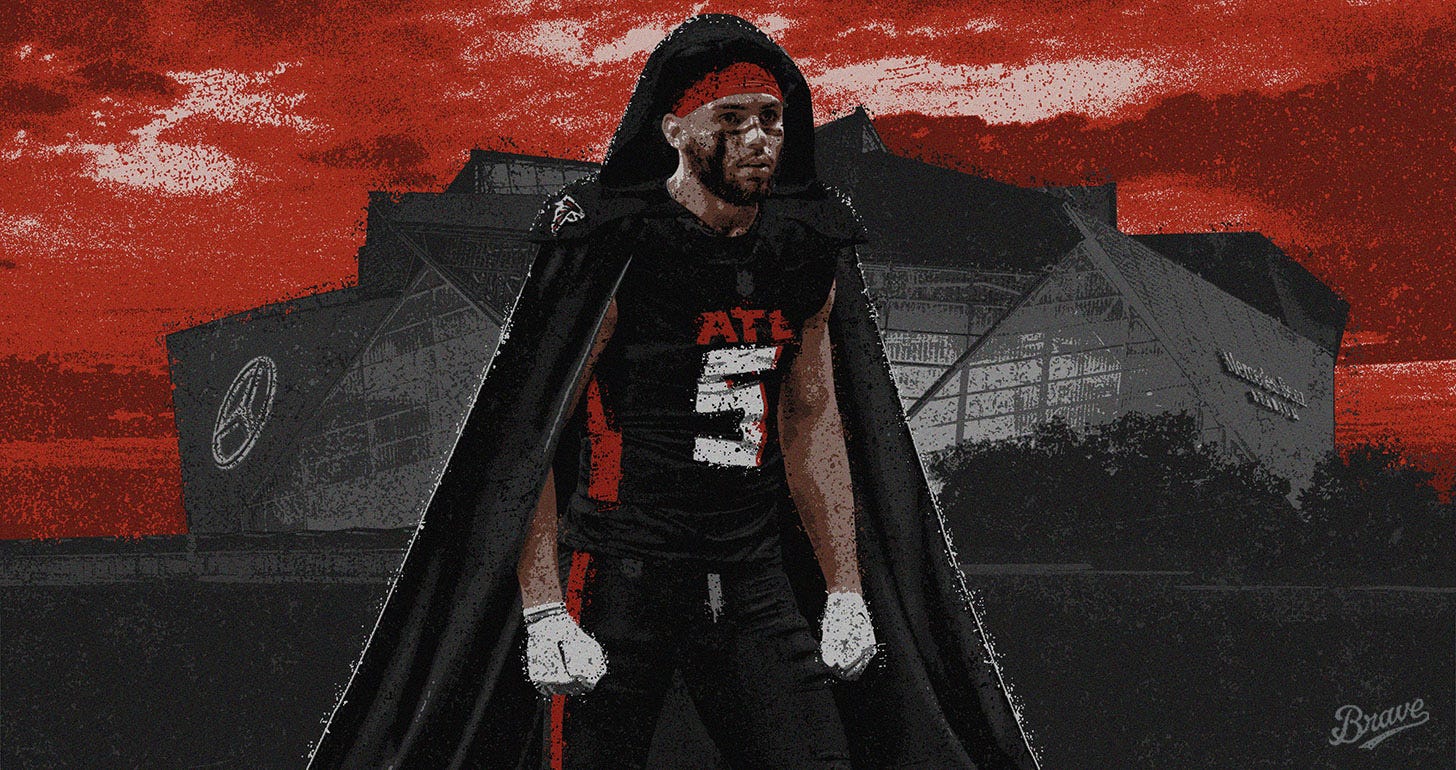
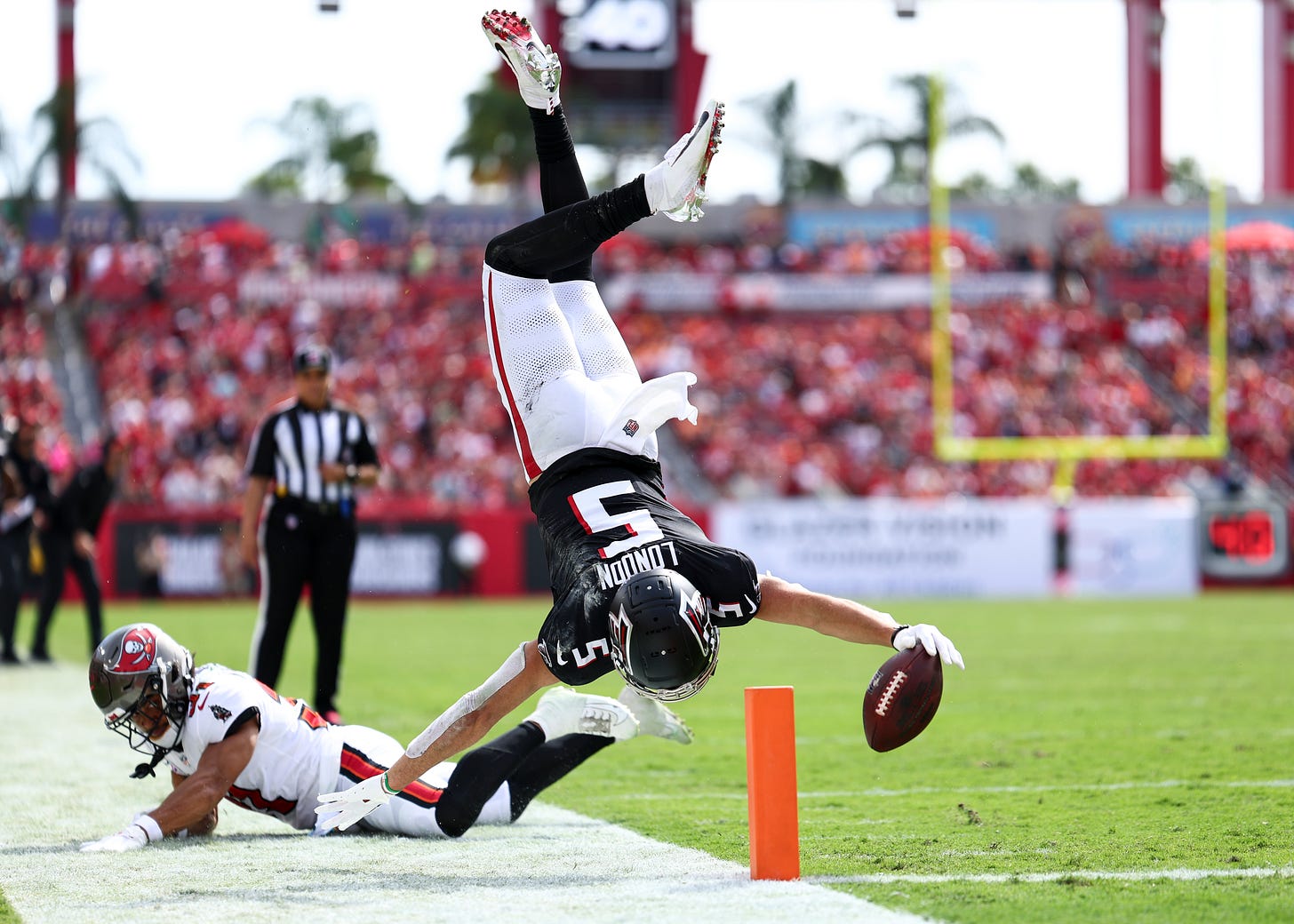
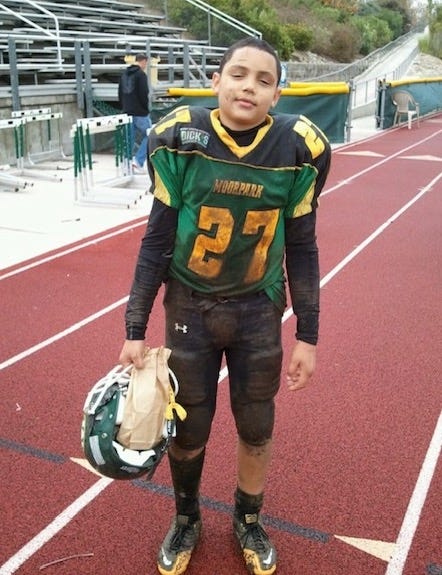
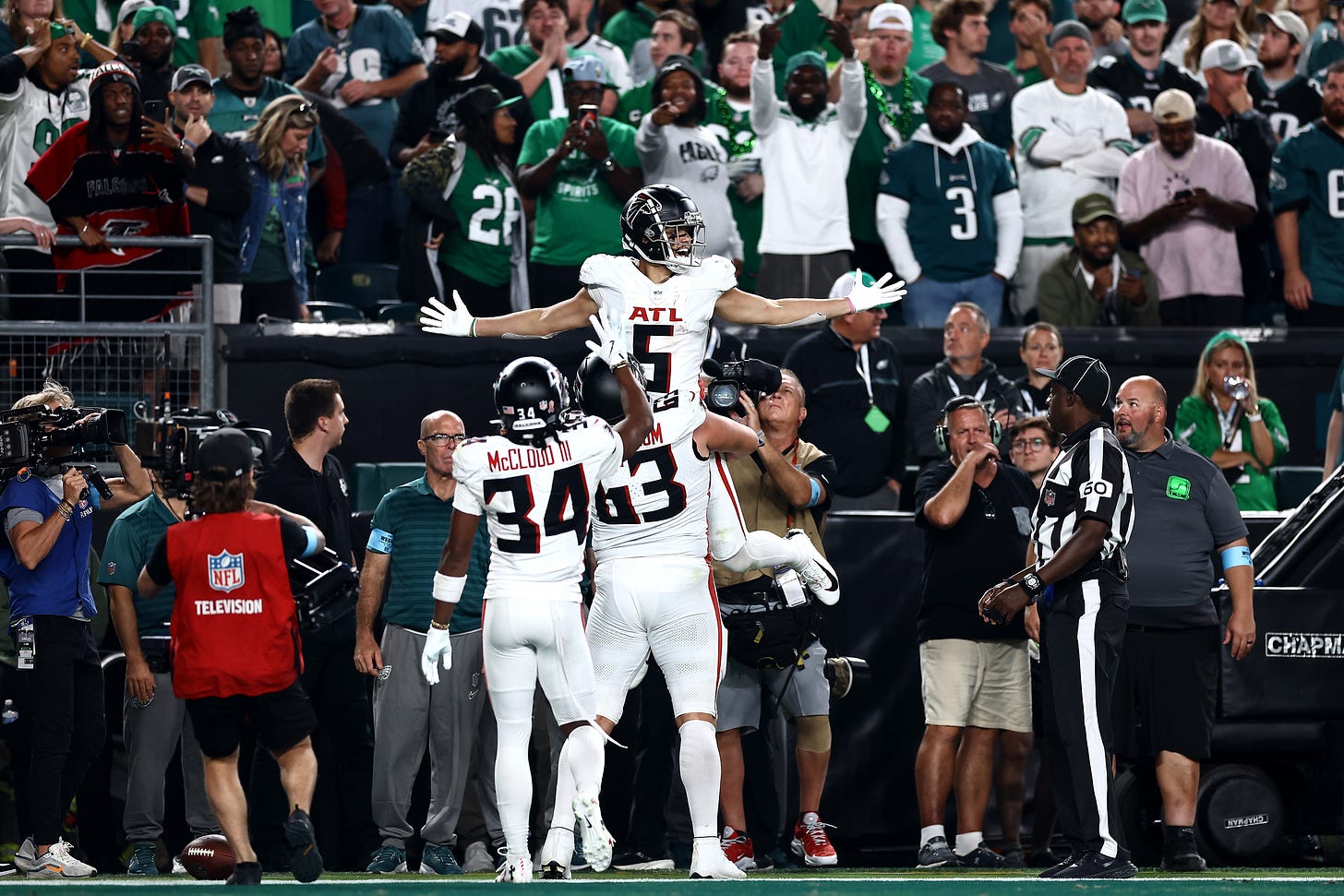
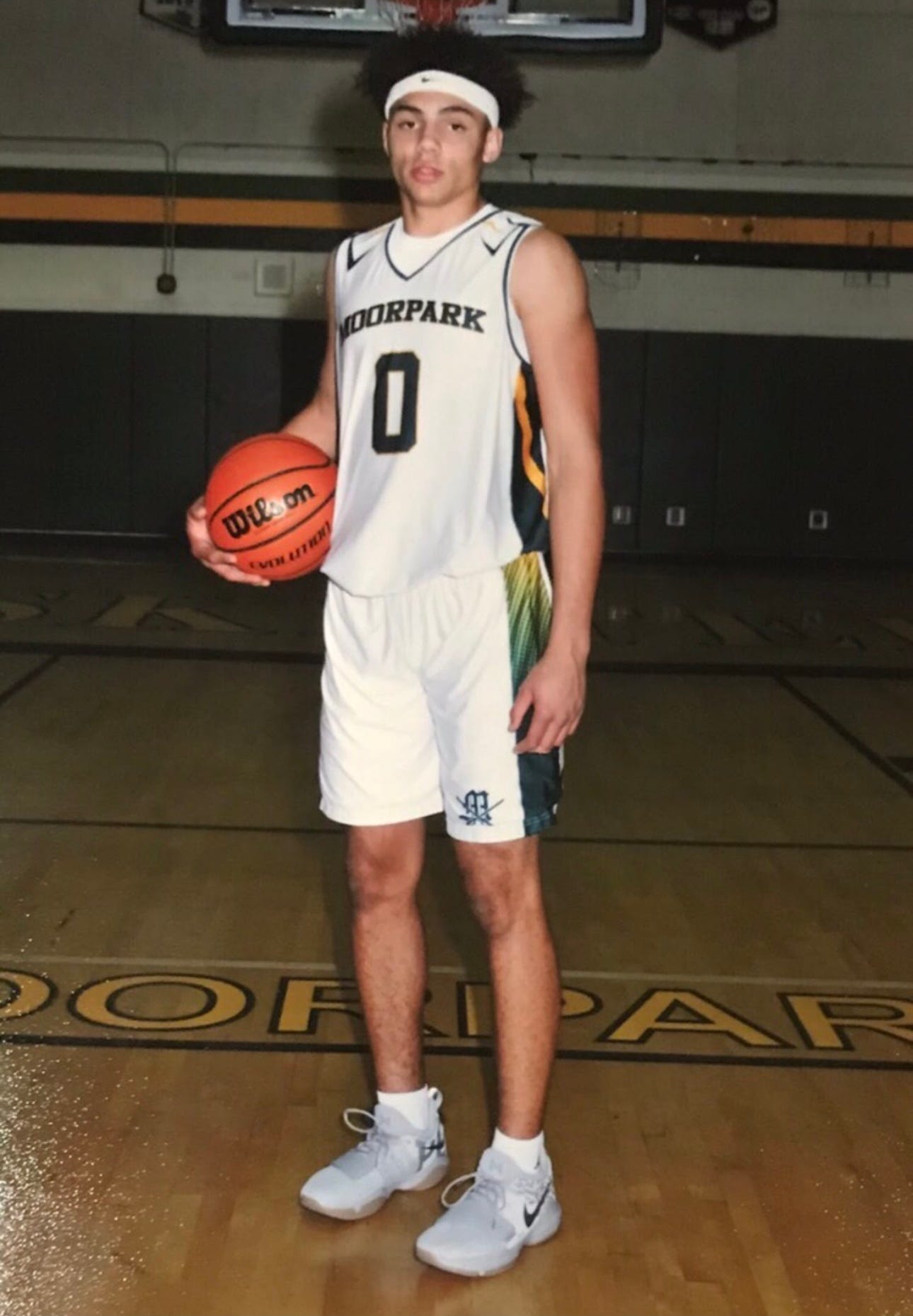
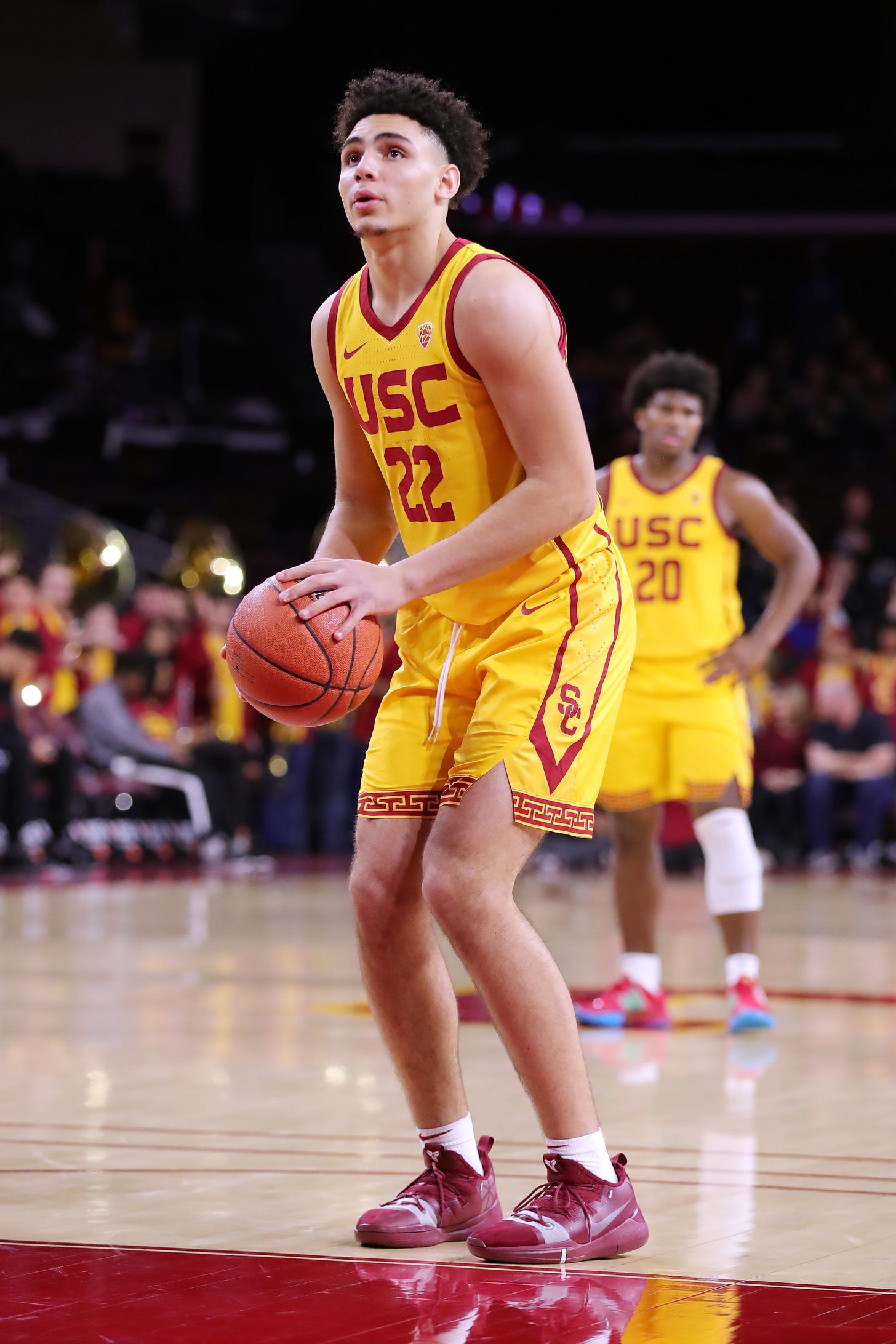
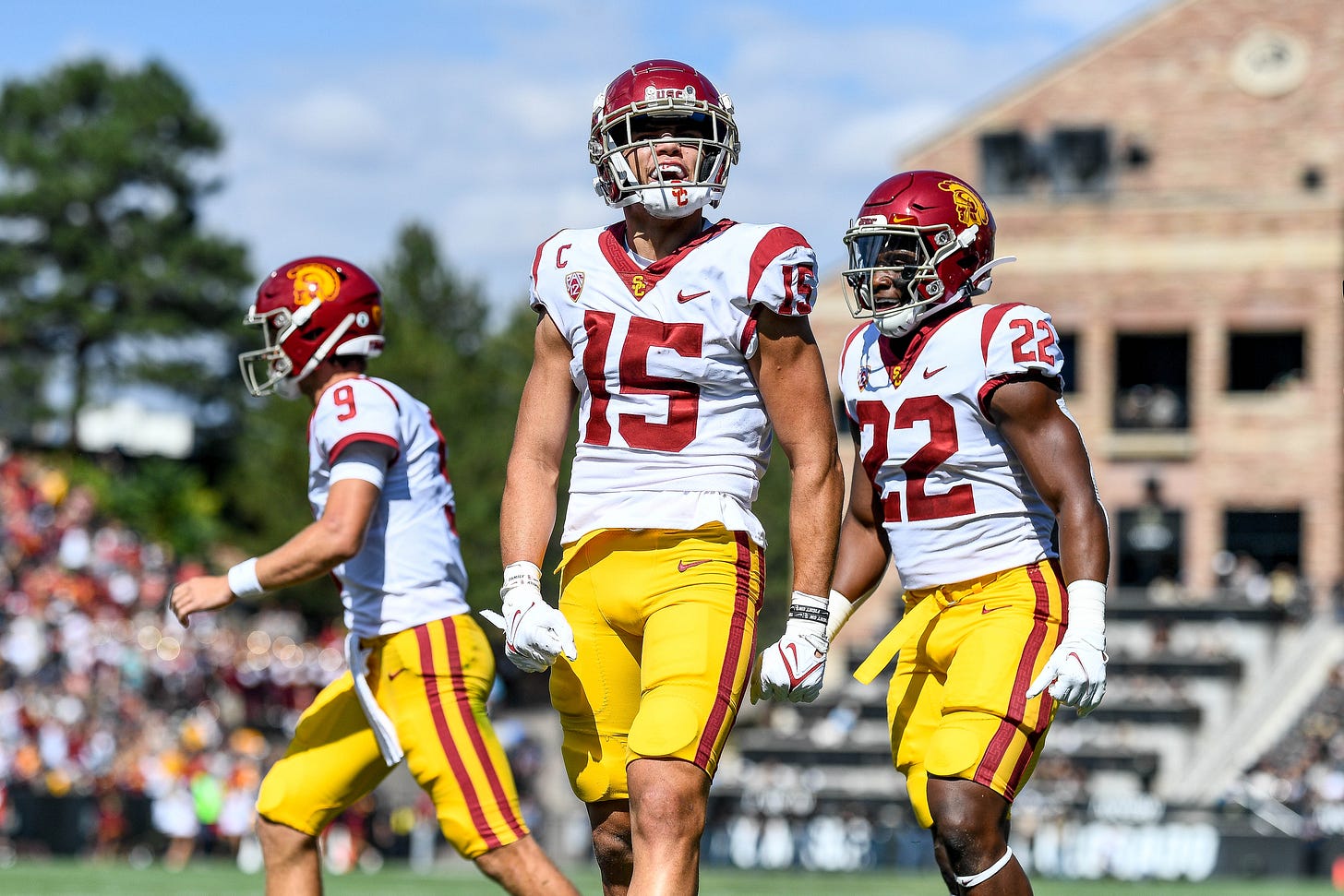
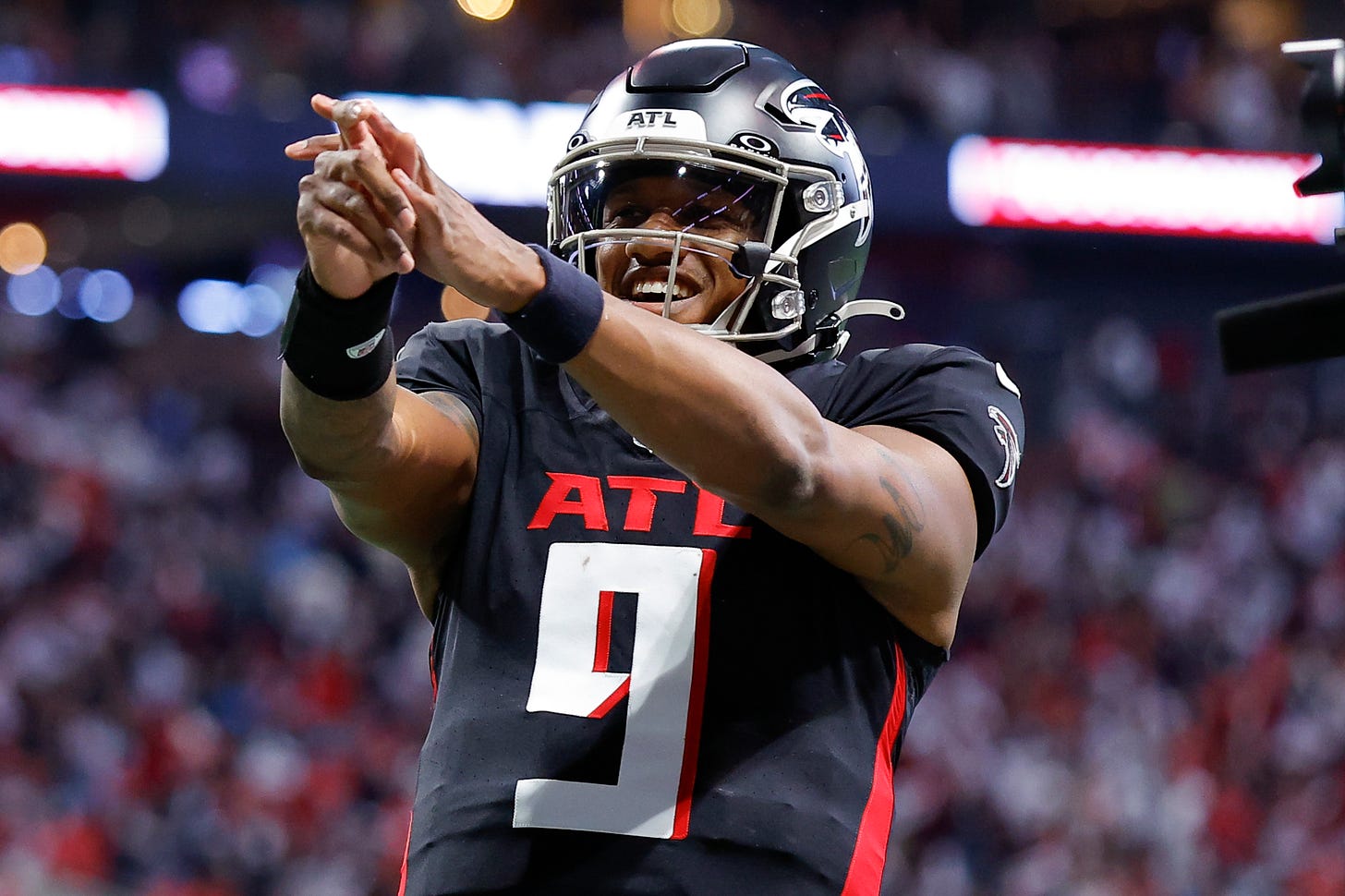
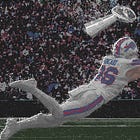
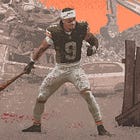


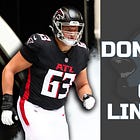
I like London's attitude "it only takes one year". With the proper alignment of GM, Coach, QB and a couple of explosive talents, it can happen.